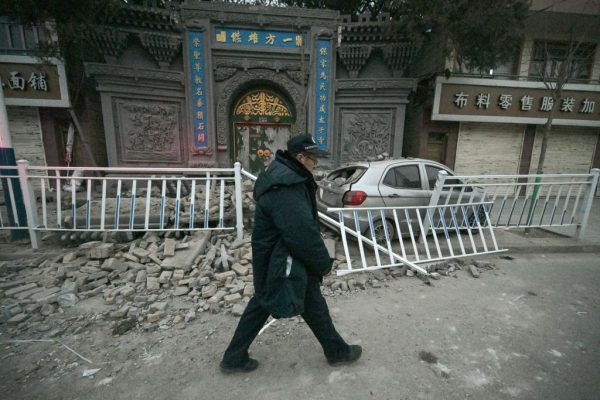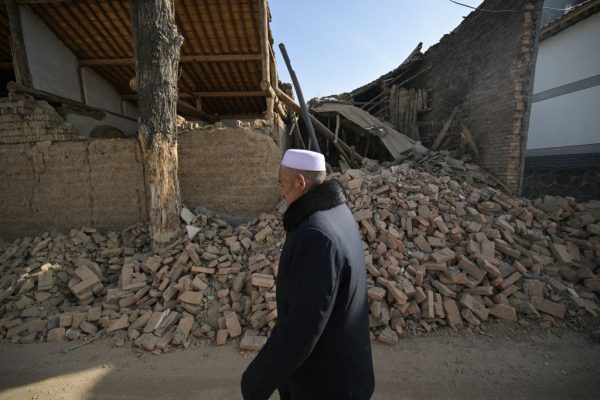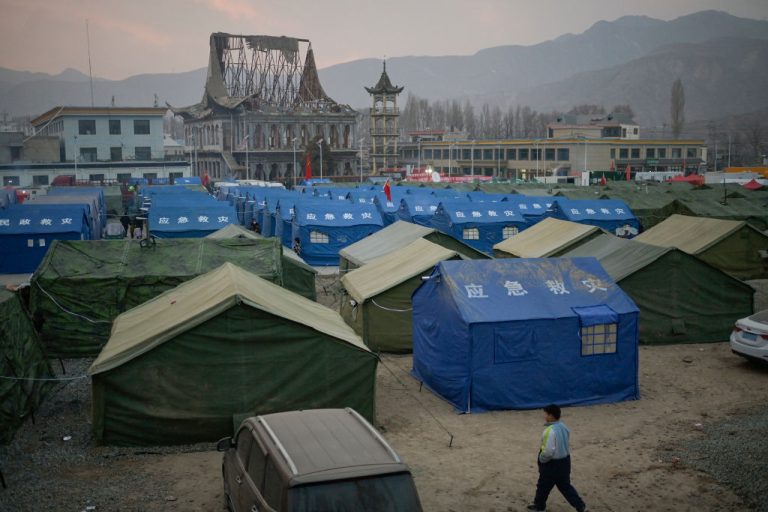In a catastrophic event that marks China’s deadliest earthquake in nearly a decade, a 5.9-magnitude quake (6.2 according to the China Earthquake Networks Center) struck Jishishan county in the northwestern province of Gansu — leaving behind a trail of destruction and despair.
The quake, which occurred late on Monday night (Dec. 18), has so far claimed the lives of at least 131 people, with hundreds more injured. Now, as rescue efforts intensify, frigid temperatures in the region reaching as low as -19 degrees Celsius (-2.2 degrees Fahrenheit) are complicating the search.
Additionally, locals who spoke with overseas Chinese-language media complained about what they said was a lack of disaster relief effort by the communist authorities.
According to local government-controlled media, the earthquake’s impact was profound and widespread. Homes crumbled, roads were damaged, and essential services like power and communication lines were severely disrupted. The tremors were so powerful that they were felt in as far away as Lanzhou, the provincial capital, located 102 kilometers (about 63 miles) away.

Magnitude of the disaster
In Gansu Province alone, the death toll stands at 113, with 772 people injured, CNN reports. Nearly 15,000 houses collapsed under the quake’s force in Dahe village, one of the worst-hit-areas in the county — compelling tens of thousands of residents to evacuate. Additionally, around 200,000 buildings sustained some level of damage.
Success
You are now signed up for our newsletter
Success
Check your email to complete sign up
In neighboring Qinghai Province, the situation is also grim — with 18 fatalities, 198 injuries, and 16 people reported missing. The quake was then followed by nine aftershocks, which added to the region’s distress.
“I’ve lived for more than 80 years and had never seen such a big earthquake,” said a resident who was being carried out of his damaged home by rescuers, Reuters reports.
Now, rescue teams are racing against time in sub-zero temperatures — a daunting task given the harsh winter conditions and forecasted cold fronts swirling through the area. This extreme weather has severely hampered rescue operations, with the bitter cold posing an added risk to both the victims trapped under rubble and the rescue workers trying to reach them.
The quake’s sudden occurrence at night left many residents feeling unprepared and vulnerable. A student at Lanzhou University shared her experience on Weibo, a popular social media site in China, describing the fear and panic as she and her roommates fled their dormitory. “Wearing a down jacket, long underwear, and bare feet in slippers outdoors, where the temperature is lower than –10 degrees Celsius, (I’m) shivering with everyone,” she wrote.

A race against time and nature
In response to the disaster, over 4,000 emergency personnel — including firefighters, police, and soldiers — have been dispatched to the affected areas. The Chinese government has also provided essential supplies such as tents, folding beds, quilts, and portable fire pits to support the displaced victims.
But the cold weather poses a significant obstacle to the rescue efforts, experts note. According to Wang Duo, an expert involved in the rescue, the “golden period” for rescue typically takes place within 72 hours, after which the chances of survival slim down by a lot. “That precious window is shortened in this case due to the biting cold,” Wang told state-run outlet China Newsweek.
While China is no stranger to earthquakes — particularly in its southwestern region where tectonic activities are more prevalent — this quake has been the deadliest since the 2014 Yunnan earthquake, which claimed around 600 lives. The memory of the devastating 2008 Sichuan earthquake — which resulted in approximately 90,000 deaths — also looms large in the nation’s collective memory.
Disaster relief efforts lacking
RELATED: Earthquake in Western Afghanistan Kills 2,400
Chinese leader Xi Jinping called for an “all-out effort” in the rescue operations. Recognizing the severity of the situation, China’s Finance Ministry and Emergency Management Ministry also allocated 200 million yuan ($28 million) in natural disaster relief funds to the provinces hit by the quake.
On the ground, however, locals affected by the earthquake reported that assistance from the authorities was far too little. “We have not received genuine aid,” a villager surnamed Zheng told The Epoch Times.
Mr. Yu, a resident of Gansu Province, also told The Epoch Times, “It’s quite serious, very serious. There may be many casualties. Because this area belongs to particularly remote regions and is relatively poor, the houses are all made of mud, very simple. The temperature is extremely low now, below zero.”
A Dec. 19 report by the People’s Liberation Army Daily, the media arm of the Chinese military, said that around 600 personnel from the local PLA garrison and People’s Armed Police in Gansu had been mobilized to help with disaster relief efforts. One helicopter had been dispatched. However, the number of people affected by the earthquake is estimated to be in the hundreds of thousands.
Citing a source with knowledge of the PLA’s rescue operations, The Epoch Times in a Dec. 20 article reported on the bureaucracy that hampered attempts by local governments to call for the military to send relief. In China, the PLA is tasked with handling most disaster relief efforts.
“The local government can only send out distress signals to the Armed Police. The Armed Police need to negotiate with the [leadership of the] military region. After the military region agrees, the armed police can go. They need to go through this process,” the source said.
Despite later state media reports claiming that thousands of personnel and hundreds of vehicles had been dispatched to Gansu and Qinghai, video taken from the areas affect by the earthquake show relief workers digging and searching with their bare hands and simple tools. One video showed rescue dogs lying around in the rubble, while a handler was apparently killing time on his phone.
Meanwhile, those trying to discuss or find information about the earthquakes online have encountered censorship, with the topic being heavily controlled on China’s major social media apps. “There’s almost no information available online about the collapsed houses in Dahexia town [in Gansu],” The Epoch Times quoted one Chinese internet user as saying.














